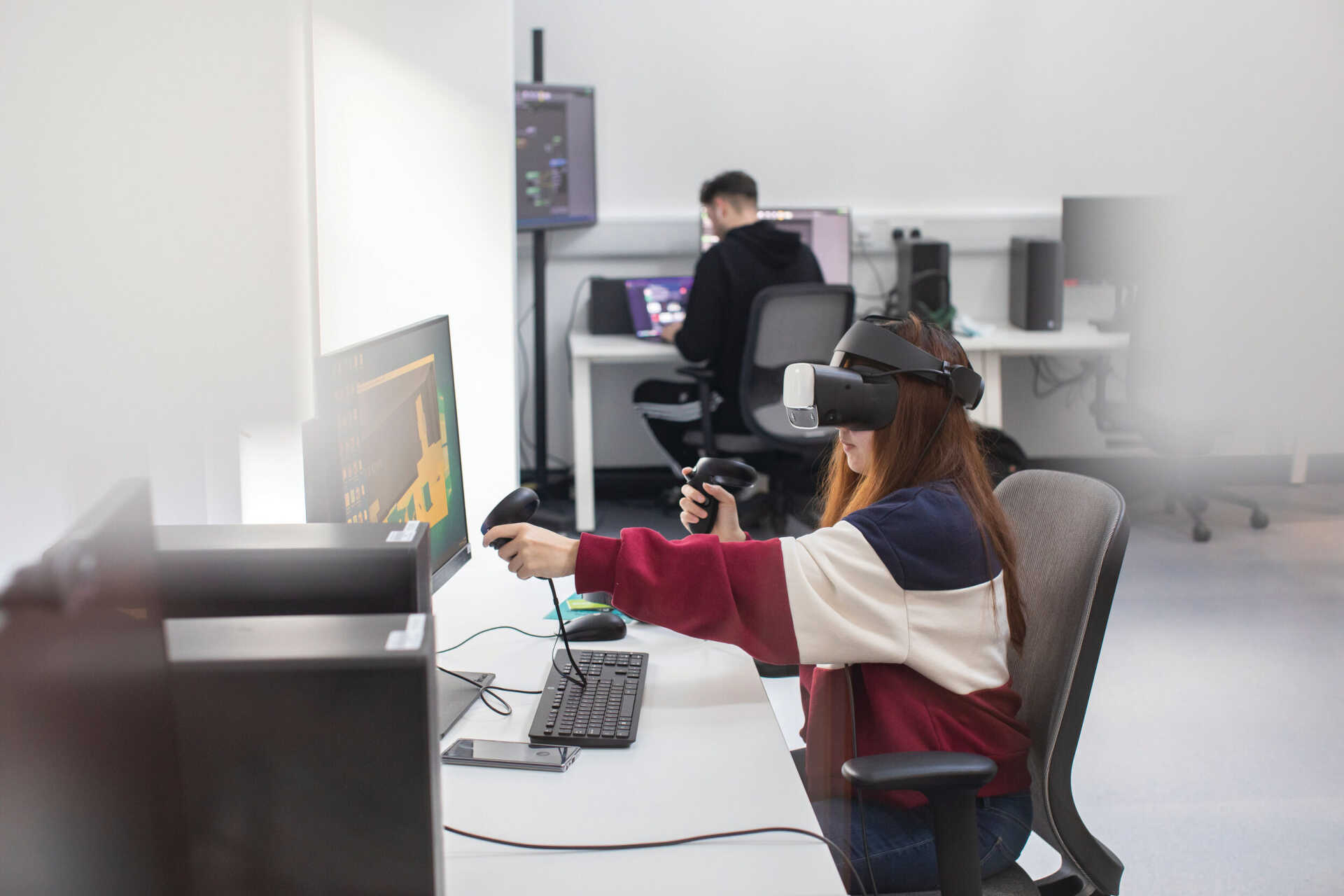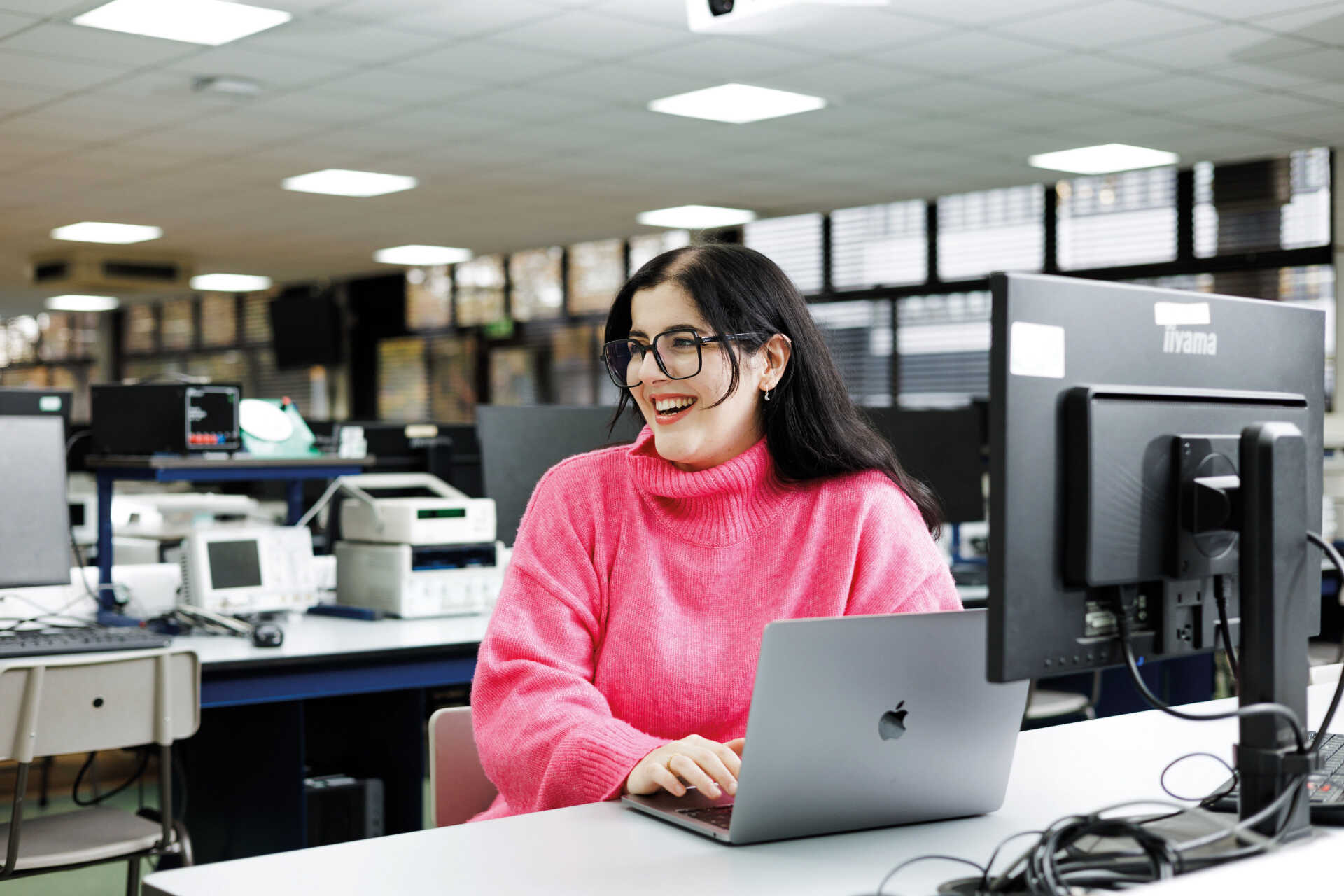Digital Design
with a Year Abroad
Design and build interactive products of the future.

Design and build interactive products of the future.
Are you excited by design and the creative possibilities of new technology? Digital Design at Kent combines both, allowing you to solve design challenges whilst gaining expertise to work in the creative industries. You'll take a practical and theoretical approach to digital design, allowing you to design and build interactive products and services of the future whilst equipping you with skills sought after by employers.
Your year abroad is taken between your second and final years. This gives you an excellent opportunity to develop multidisciplinary skills through experiencing a new culture, and to discover how your subject is taught in a different environment. You are taught in English and destinations may include universities in the US, Singapore and Australia. For current destinations please see our Study Abroad Course List.

We have excellent industrial links, providing you with many placement opportunities.
Art and Design at Kent was ranked 16th overall in The Complete University Guide 2024.

You'll develop design and technical skills to showcase your creativity. Here are some examples of the work our students have produced.
Access events with specialist industry guest speakers, giving you a professional network before you graduate.

Read how Kent alumni helped to make the new version of The Lion King a box office hit. What role will you play in the films of the future?
Our typical offer levels are listed below and include indicative contextual offers. If you hold alternative qualifications just get in touch and we'll be glad to discuss these with you.
BBC
Distinction, Merit, Merit.
112 tariff points from your IB Diploma, including Maths at 4 at HL or SL, typically H5, H5, H6 or equivalent
Pass the University of Kent International Foundation Programme.
The University will consider applicants holding T level qualifications in subjects closely aligned to the course.
Obtain the Access to HE Diploma in Art and Design OR Creative Arts OR Creative Industries OR Design OR Film and Creative Digital Media OR Games Design, with a minimum of 45 credits at Level 3 with 18 credits at Distinction and 24 credits at Merit.
The following modules are what students typically study, but this may change year to year in response to new developments and innovations.
Programming underpins all facets of modern life, from basic software applications to complex artificial intelligence systems. It enables everything from simple mobile apps to large-scale enterprise solutions.
You'll embark on your programming journey here, mastering fundamental coding concepts and development skills. This foundation will empower you to dive into programming projects right from your first year through lectures, workshops and programming challenges.
You’ll also examine the pivotal role of programmers in shaping and advancing society by exploring ethical and societal considerations essential to contemporary professional programming.
If you aspire to pursue a career in 3D - in industries such as film, Visual Effects (VFX), product visualisation, gaming, or advertisement - your first step into this world is to learn the fundamental principles of 3D.
Through a combination of engaging lectures and interactive workshops, you’ll learn the theoretical underpinnings and hands-on practical skills required to conceptualise ideas, model, UV map, create and manipulate materials, and texture 3D assets.
In addition, you’ll learn how to showcase your work effectively and in a form that meets industry expectations, to boost your future employment prospects in the future. This involves understanding the principles of creating digital cameras, lighting, rendering, and compositing.
Unlock your creative potential through this practice-based module where you will bring your ideas to life. You’ll learn fundamental skills in the development of creative digital content, from design fundamentals such as composition and colour to audio and visual production techniques.
You’ll develop technical skills in industry-standard software tools whilst also demonstrating your creativity and problem-solving abilities. You’ll learn to conceptualise and execute design briefs with confidence, and engage in reflective practices to evolve as a versatile creative professional.
Whatever field of digital design you’re passionate about, this module is your gateway to unleashing the boundless potential of your creative imagination.
In the digital age, everywhere we look we are surrounded by virtual worlds. Discover the ins and outs of designing virtual environments, and get hands-on experience creating real-time applications to showcase your skills.
You’ll learn asset development for different applications, dive into narrative and storytelling design, and explore the field of event programming for cinematic and interactive immersion.
You'll discover a range of creative tools to foster creativity and wider design practices to take your projects to the next level. Beyond the underpinning theory, you'll put your knowledge into practice. By the end of the module, you’ll be prepared to tackle a project that will showcase everything you've learned in this journey into virtual environment design.
What are the key digital tools and platforms that are central to interaction design? How do these shape our daily lives? This module is designed to blend your creativity with technical skills to improve the functionality and relevance of digital interfaces, from apps to websites.
Focused on user-centred design, it empowers you to create experiences that resonate with diverse audiences, emphasising the importance of making your designs accessible and inclusive for all. This module takes you beyond basic usability, encouraging you to consider how your designs can have a positive impact on society.
Through studying fundamental design principles and methodologies, you'll acquire the skills needed to develop digital products and services that are both meaningful and effective.
Interacting with digital systems forms the bedrock of our modern-day existence, from turning on a light to controlling advanced robotic devices. Here, you’ll embark on a transformative journey into the world of programming and interactive hardware, where you’ll gain essential skills and grasp fundamental concepts from the outset.
Through practice-based tuition, you'll unravel the art of image manipulation, bring realistic motions to life, and explore skills like motion sensing and speech recognition.
As you move through this module, you'll delve into the ethical and societal dimensions surrounding contemporary programming practices, acknowledging the profound impact programmers have in shaping our evolving society.
Do you dream of a career working in the diverse and exciting visual effects industry? Whether you aspire to work in film, TV, games, architectural visualisation, or digital marketing and beyond – you’ll navigate the 3D production pipeline using the latest industry-standard tools and techniques.
Immerse yourself in hands-on lessons, learning the art and technical skills of digital visual effects and compositing. Let your creativity thrive as you delve into practice-based workshops filled with opportunities to expand your skills and understanding. You’ll look at everything from designing intricate models to painting detailed textures, harnessing the power of lighting effects and exploring the development of materials, seamlessly bringing them all together in precise and convincing composites.
This module enables you to develop your artistic eye and practical skill set so that you can showcase your work effectively, helping to prepare you for an exciting career in the future.
We live in interactive environments. Sensors notice our presence when we enter a room and we use contactless cards at a counter or door. Sensing and display technologies are increasingly embedded in the world around us, so how can we use these innovations to design interactive media experiences for the real world?
Through exposure to creative examples and the technologies used to produce them, you'll learn about the different contexts in which digital displays and interactive technologies are embedded. You’ll also learn how they can be designed to be engaging, breathtaking and playful, such as in festivals, exhibitions, events, concerts and shows.
By the end of the module, you'll have gained conceptual and hands-on knowledge for how to develop and prototype creative outputs and design interactive media solutions for real-world scenarios.
As immersive technologies play an increasingly crucial role across diverse sectors of our economy, the ability to design meaningful user-centric experiences is more essential than ever. This module empowers you to leverage real-time engines and immersive storytelling, guiding you to produce content that deeply engages your audience.
Tailored to support every phase of your educational journey, the lessons will elevate both your creative insight and technical expertise. You'll explore the core principles of immersive technologies and understand the critical role of storytelling in developing compelling virtual experiences. Moreover, you'll learn techniques for user evaluation, integrating testing and feedback seamlessly into your design workflow.
This comprehensive approach prepares you to create immersive experiences that truly make a difference for users, signifying your readiness to innovate within the fast-evolving landscapes of digital technology and interactive media.
Welcome to your first major project, where you will embark on an exciting journey working on a real-world design problem. This substantial project challenges you to combine the theoretical and practical knowledge you have gained so far and delve deep into understanding the nuances surrounding the design problem, including the factors that contribute to and affect it.
You’ll further develop your skills in ideation, conceptualisation, and implementation - you’ll develop innovative design solutions, drawing upon the diverse technical and artistic skillset you have acquired during your studies to execute the project. You’ll learn how to perform different testing methods to evaluate your design solution’s usability, friendliness, and quality. Working in a collaborative environment, you’ll navigate time and resource constraints, developing project management skills vital in any professional setting.
Furthermore, you’ll explore different methods to effectively convey your project outcomes to a wide audience. This module also emphasises the ethical aspects of design throughout the design process, such as copyright, human participation, intellectual property and data protection.
You have unique design skills, but how do you prefer to work and what personal and teamwork strengths would you bring to a start-up design agency?
You'll identify your strengths and talents, form a start-up creative agency with classmates, and pitch work to clients. Together you’ll then formulate solid briefs and identify measurable outcomes. Through practical application, you’ll develop an appreciation of the commercial and financial concerns of the creative business sector, and show your work to a public audience.
By the end of this module, you’ll have an insight into working for a design studio, what it means to be ‘employable’, understand the changing creative job market, and be well-placed to make appropriate career decisions. More importantly, you will have started to develop your professional network.
Data visualisation transforms data and information into graphical representations. What tools do designers use to ensure the resulting visualisations are simultaneously accurate and compelling?
You’ll explore the theory and practice of transforming sometimes complex datasets into compelling visual narratives. You’ll also learn to interpret and communicate data effectively, exploring various visualisation techniques and tools. The teaching emphasises understanding the principles of information design, including hierarchy, clarity and accessibility, as well as data ethics and the importance of accuracy in creative solutions.
By the end of this module, you’ll be able to analyse datasets and generate stories around them, honing your ability to distil insights and engage audiences through visually impactful designs. You’ll be proficient in creating data-driven design solutions that inform and engage. You’ll also emerge with a heightened understanding of the role of graphic design in shaping perceptions and facilitating understanding in an increasingly data-driven world.
Are you interested in starting your own business? What are the tools and skills you need to do so? Why are startups becoming more popular? We’ll delve into the social and economic changes that have raised the status of enterprises, small businesses, and entrepreneurial ventures in the global economy.
We’ll consider entrepreneurs, their characteristics and motivations, and the barriers and issues that they face when planning and establishing a new startup venture. You'll learn what makes new ventures grow and succeed, and evaluate the practical decisions that entrepreneurs need to make to maximise the chances of their business succeeding.
Going abroad as part of your degree is an amazing experience and a chance to develop personally, academically and professionally. You experience a different culture, gain a new academic perspective, establish international contacts and enhance your employability.
You are expected to adhere to any academic progression requirements in Stages 1 and 2 to proceed to the year abroad. If the requirement is not met, you will be transferred to the equivalent three-year programme. The year abroad is assessed on a pass/fail basis and will not count towards your final degree classification.
For further information, please see Go Abroad.
Where could you go in a year?
My ‘You only live once’ decision to study in Japan is one of the best I’ve ever made. I had a fantastic year.Cheyenne Nolan Find out more
Advanced 3D allows you to enter into the creative world of 3D animation and effects simulation! You will be equipped with industry-leading advanced tools and techniques tailored for animation and simulation pipelines.
Underpinned by theory, the application of practical skills is your gateway to mastering essential industry-standard applications and elevating your critical eye to be aligned with demanding industry expectations. Gain a comprehensive understanding of the wider production process, furthering your knowledge of 3D animation and digital effects simulation. Here, you'll learn to breathe life into your creations and create stunning visual experiences.
Take newly acquired skills and understanding to a cross platform level, embedding your learning in a broadly applicable advanced skillset. Thinking about a career in film? TV? Interactive applications? Immersive? Games? This module has got you covered. Level up your skills and become a formidable force in the realm of digital effects.
Mixed reality (MR) is weaving its way into our daily lives, transforming how we learn, shop, work and play. From interactive educational content that brings history to life, to virtual try-ons in fashion retail, remote collaboration tools that bring dispersed teams together, and gaming experiences that blur the lines between the physical and virtual worlds, MR tools are becoming indispensable.
You’ll learn how to design and implement MR systems, and uncover the potential of MR technology and its implications for designing interactive experiences that seamlessly integrate digital content with the physical world.
Through a blend of theory and practical applications, you’ll explore current trends, ethical considerations and future potentials in MR. You’ll also engage in projects that challenge you to think creatively and critically about the development of immersive, user-centric MR applications. This comprehensive approach equips you with the skills needed to innovate and lead in the rapidly evolving MR landscape.
Embark on an exciting journey of creativity as you dive into a self-directed project where your imagination can flourish. Build on your skills and experience, as well as your ability to conceptualise, manage, and complete a major project to professional standard, ready to showcase your skills to employers as you prepare for graduate employment.
From research and conceptualisation, to ideation, development and testing, you’ll develop a project which fosters a deeper understanding of digital design principles and practices, pushing the boundaries of your creative and technical abilities. You’ll navigate time and resource constraints, further developing your project management skills which are vital in any professional setting.
From interactive and immersive experiences to visual effects, you can build the project around your own interests. This isn't just a module - it's your chance to push boundaries, to focus on an area you are passionate about, and to craft a capstone project for your portfolio that shines.
Why are so many films and television programmes adapted from other sources? Why do such adaptations frequently evoke powerful responses from viewers and critics? What role does screenwriting play in the adaptation process?
You will consider these questions as you explore the popularity of adaptations within popular culture. The module will provide the close study of screen adaptations taken from a variety of media which may include theatre, classic novels, short stories and comics. In doing so, you will engage with key topics from adaptation studies, considering the connections and differences between distinct media, focusing on key features such as the manipulation of time and space, characterisation, point of view, style, voice, interpretation and /or evaluation.
You will be encouraged to consider adaptation within an industrial context and the creative and practical implications of adapting works for the screen. You’ll have the opportunity to develop your own creative interests within adaptation studies in conjunction with a deeper understanding of the key theoretical concepts underpinning the discipline.
Why do audiences flock to certain films? How do you raise awareness of a particular film and encourage them to see it? What kind of strategies are best suited to promoting different types of film? These are the kind of questions faced by people working in film marketing and distribution – key figures in the industry and just as important as the content producers (filmmakers, actors) whose work they promote.
You will learn how marketing is used to mitigate risk and maximise revenue; what forms and formats film publicity takes and the purpose they serve; how distributors purchase rights and assemble lists; how distributors and marketers position individual films to certain target audiences and territories; how film audiences select which films to view; how cinematic exhibition fits within multi-platform distribution strategies and the rise of ‘non-traditional’ distribution portals (e.g. Netflix and Amazon).
You will also learn how to market a film and gain hands-on, practical experience of creating your own marketing materials, this gives you a greater understanding of the whole process of marketing and distribution, a key skill when breaking into the industry.
The video games industry is the biggest entertainment industry in the world, with Rockstar Games’ Grand Theft Auto V the most successful entertainment product of all time. But how well do we understand that industry? Why do so many people play games, and what effect has video gaming had on our lives?
You will explore the history, technological development, and social issues surrounding video gaming. We will cover the technological and industrial advances in game design over the past 50 years, as well as how video games have been presented in contemporary marketing and modern media.
This will likely be your first exploration into the field of game studies (including game theory), and how it can help us understand different game genres, game mechanics, and game content. Across the module, you will learn about intersecting questions of narrative, interactivity, space, play, players, and representation. This is your chance to level-up your skillset and make rapid progress in an expanding and exciting industry.
Over the past few decades, video games have evolved into a mature digital medium, influenced by and driving advancements in GPU technology and AI. The commercial success of video games has spurred the accessibility of sensor technologies, leading to the rise of immersive technologies like virtual reality, paving the way for spatial computing.
Given the significance of video games in popular culture and the cutting-edge technological advancements, delve into this video game module, where you will learn various facets within video game design and development, encompassing game physics, AI, level design, player behaviour, game rules and mechanics, and user interfaces.
Through hands-on instruction, you are introduced to game development utilising state-of-the-art game engine. Additionally, you will extend the application of these skills in designing immersive and spatial computing applications, so you have all the tools you need to break into an exciting and expanding industry.
What role do the technological innovations of today play in what you will be designing in the future? And how do these technological innovations impact on the design needs and requirements of tomorrow? Technologies such as machine learning, mixed reality, robotics, data sharing and cybersecurity are transforming how we design services around healthcare, learning, transportation, communication, homes and workplaces.
By engaging with the social and cultural transformations brought about by the rapid developments of digital technologies, you will learn to evaluate these technologies and about how to future-proof your designs, and design with an inclusive mindset, thinking about the design requirements that will suit future needs. We will introduce case studies of major technological and design developments and invite you to explore their impact on culture and society via a combination of face-to-face and individual research. So, how about learning to critically engage with current socio-cultural trends and technological innovations and using those insights to help you design the future?
Most modules consist of a mix of lectures, seminars, practical work, computer sessions and private study. The workstations in our computer suites are equipped with current industry-standard software.
Our students have 24-hour access to our extensive air-conditioned computer suites and are able to take advantage of a dedicated production studio, with green-screen, VR suite and makerspace.
For a student studying full time, each academic year of the programme will comprise 1200 learning hours which include both direct contact hours and private study hours. The precise breakdown of hours will be subject dependent and will vary according to modules.
Methods of assessment will vary according to subject specialism and individual modules.
Please refer to the individual module details under Course Structure.
For course aims and learning outcomes please see the course specification.
Our graduates thrive in dynamic areas like immersive experiences, UX/UI design, 3D production, and creative media. You'll master the art of visual design, user experience, and technology, enabling you to leave your mark in dynamic, ever-evolving industries. Whether you're passionate about creating captivating visuals, immersive experiences, or exploring virtual environments, digital design equips you with the skills and connections to excel.
Our comprehensive career support includes EmpFest, a two-week Employability Festival presented by your dedicated Careers and Employability Service. Featuring an array of presentations, workshops, guest speakers, and industry experts, EmpFest provides invaluable insights and guidance for your career journey. You'll also have the opportunity to network with a diverse range of organisations during our Careers Fair, a highlight of the festival, where you can connect with potential employers and explore exciting job prospects.
Creative UK has recently relaunched their Student Membership which is available to all education Federation members, which means that University of Kent students can access free student membership. The membership is designed to propel the careers of emerging creatives.
*The Government announced on 4 November 2024 that tuition fees in England for Home students will increase to £9,535 from £9,250 for the academic year 2025/26. This increase requires Parliamentary approval, which is expected to be given in early/mid 2025.
Tuition fees may be increased in the second and subsequent years of your course. Detailed information on possible future increases in tuition fees is contained in the Tuition Fees Increase Policy.
The University will assess your fee status as part of the application process. If you are uncertain about your fee status you may wish to seek advice from UKCISA before applying.
For details of when and how to pay fees and charges, please see our Student Finance Guide.
Fees for undergraduate students are £1,900.
Fees for undergraduate students are £1,430.
Students studying abroad for less than one academic year will pay full fees according to their fee status.
You will require regular access to a desktop computer/laptop with an internet connection to use the University of Kent’s online resources and systems. Please see information about the minimum computer requirements for study.
You will require regular access to a desktop computer/laptop with an internet connection to use the University of Kent’s online resources and systems. Please see information about the minimum computer requirements for study.
Kent offers generous financial support schemes to assist eligible undergraduate students during their studies. See our funding page for more details.

We have a range of subject-specific awards and scholarships for academic, sporting and musical achievement.
We welcome applications from students all around the world with a wide range of international qualifications.

Student Life

Powered by progress
Kent has climbed 12 places to reach the top 40 in The Times Good University Guide 2025.
Kent Sport
Kent has risen 11 places in THE’s REF 2021 ranking, confirming us as a leading research university.

An unmissable part of your student experience.